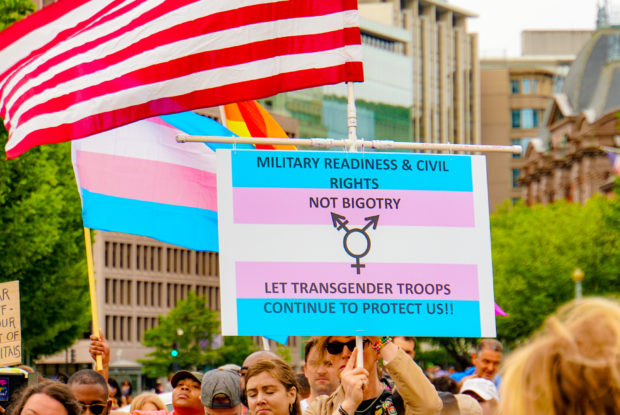Finally, a DoD Concession That Trump’s Transgender Military Ban is Simply Discrimination Based on Gender Identity
Two years after a string of presidential tweets set a ban on transgender military service in motion, fifteen months after the former secretary of defense backfilled an after-the-fact justification for those tweets, and two months after the ban took effect, the Department of Defense has now conceded that the ban works by treating transgender people in uniform differently from everyone else. The new policy isn’t about a need for medication, or about fitness, or about deployability, or about “standards.” It’s about banning transgender people under circumstances in which not-transgender people would be permitted to serve.
During a trip to Europe to join in events commemorating the 75th anniversary of D-Day, President Trump gave an interview to British television in which he attempted to explain why he banned transgender people from military service.
Trump asserted that transgender people “take massive amounts of drugs” (and later repeating, “massive amounts”). That wouldn’t work in military service, he said, because “you’re not allowed to take drugs, you’re in the military you’re not allowed to take any drugs, you take an aspirin . . . [pausing, without completing the thought]. Therefore, in Trump’s mind, “You would actually have to break rules and regulations in order to have that [transgender people serving].”
(It wasn’t clear whether Trump meant to say military rules were so strict that even taking an aspirin violates policy, or that aspirin is the only drug that DOD uses to treat illness and injury in service members. Either way, it was nonsensical.)
DOD issued a correction to the commander-in-chief’s assertions about military service and military medical care. DOD did not attempt to paper over all the inaccuracies and did not attempt to rescue any arguments for Trump’s Department of Justice to use in defending the return to a ban in court. It issued a correction that basically said, “Wrong, wrong, wrong,” and in doing so, for the first time made startlingly clear that the ban depends on intentional discrimination against transgender troops, because otherwise they would meet military standards.
“The Military Health System covers all approved medically necessary treatments and prescription medications,” DOD spokeswoman Jessica Maxwell said. “If a service member has a hormone deficiency for any reason (such as hypogonadism, hypothyroidism, menopause, etc.), he or she would be prescribed hormones.”
Maxwell also assured that existing troops who had been diagnosed with gender dysphoria before the transgender ban went into place in April “will continue to receive all medically necessary treatment.”
This statement may be the most candid and least dishonest statement that Trump’s DOD has made about transgender military policy. It concedes a wide range of facts that in the past DOD has avoiding conceding:
- As a general matter, DOD does provide all medically necessary care to people in military service. DOD does not limit that care, provided members can meet general standards of fitness within the required period of time. (Except for transgender service members. The ban dictates that their medically necessary care is an immediate basis for separation, even if treatment would not prevent them from meeting fitness standards.)
- Yes, people in the military take prescription medication, as everyone (almost everyone) knows.
- DOD provides hormones to service members routinely—the same hormones that transgender people take, just for a different reason. (But the ban dictates that if a transgender service member requires a hormone prescription, they will be separated regardless of fitness for duty.)
- And contrary to the findings endorsed by Trump’s former defense secretary, DOD believes there is a medical consensus that gender-transition treatment IS in fact appropriate and medically necessary care for treatment of gender dysphoria. DOD will provide the care to troops with grandfathered protection under the ban, but will separate any non-grandfathered troops who need it.
Department of Justice lawyers must be screaming in frustration after this DOD concession. We have not seen a clearer statement from DOD that the policy is simply discrimination based on gender identity.
